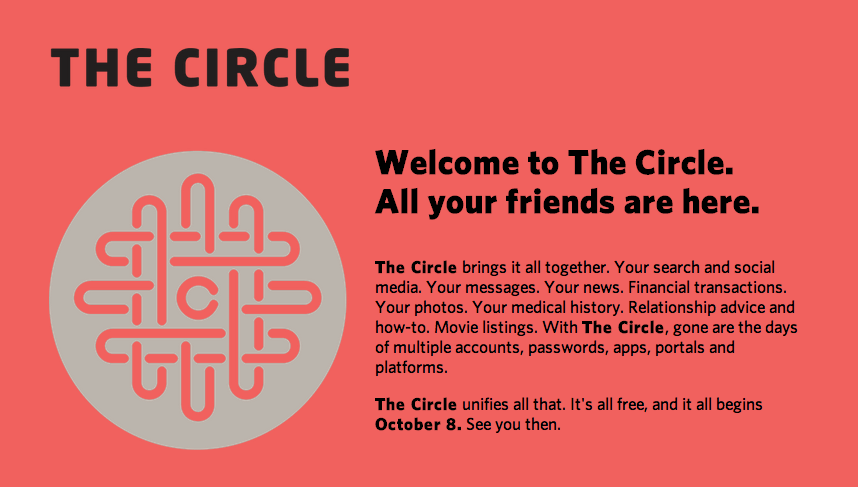If you’ve read Dave Eggers’s not-so-distant-future dystopian novel The Circle, wherein a Google-type company assumes total control of the world’s governments and privacy, at least one of three questions has probably crossed your mind:
- Can Dave Eggers get any preachier?
- Should we be afraid that we’ll all eventually be required to wear tiny cameras on our chests, thus getting only two real minutes of privacy per day when we enter a bathroom stall?
- What would it be like to actually have all the world’s data, on everyone and everything, and how would that affect human experience?
Out here in 2014, we’re not quite on a straight track to “completion,” as Eggers refers to the concept of connecting everything and everyone in the world digitally. But for all his unconcealed blasting of the tech world, there are points he makes that draw attention to the negative affects of our insatiable need for data.
Today, if you want to do pretty much anything, like see a movie, go to a restaurant, buy a good pair of pants, or travel to Cambodia, there’s a wealth of information available to help guide you. It’s actually incredible if you really think about it. The cultures of companies like Yelp and Amazon cherish community and feedback, encouraging their users to give ratings and reviews anytime they visit a place or buy a product. In theory, if everyone who’s ever visited a given shrimp shack on the North Shore of Oahu has given it a star rating and a short review, there’s a totally comprehensive assessment of that place available to anyone who wants to try it.
On paper, this sounds pretty ideal. Like, okay, cool, we never have to waste our time or money on goods or services that are terrible, because we can make an educated decision before we do just about anything based on others’ similar past experiences. As a frequent moviegoer, I get a ton of value out of this phenomenon—I don’t think I’ve paid to see a “rotten” movie in theaters since Speed 2: Cruise Control (see what happens when you lose the start power of Keanu Reeves?).
Realistically though, you can only rely on Rotten Tomatoes, Yelp, Amazon, travel guidebooks, etc. so much. You’re going to project your own shit onto whatever movie/show/food/product you encounter, so no matter what the prior collective mood about that experience is, it’s never going to totally align with what you think. Unless, of course, you give in and let that be the way you operate all the time. The thing about checking reviews of anything before you try it is that you’re letting your natural disposition immediately get skewed, and in some ways, already letting that govern how much you’re going to like or dislike an experience.
It totally makes sense to want to test the waters, because let’s face it, few things are more upsetting than paying $14 to see a movie that’s absolute garbage. Still, there’s no denying that reading reviews eliminates the authenticity of truly experiencing something for the first time. Furthermore, if you live and die by them, you’ll never come across diamonds in the rough that you can brag to all your friends about “discovering” first. To take it one step further, you’ll never really try something totally “new.”
If this all comes off as Eggers-style preachy, yeah, that makes sense. Sorry. But the fact of the matter is that the Internet takes word of mouth to outrageous new heights. Instead of hearing about something cool through a friend, you’re drowning amidst everyone who’s ever had an opinion about anything. So if you want to escape it, ditch every worldly possession you own and go live in the Alaskan wilderness or something. Then you’re REALLY authentic, and that’s the coolest way to be, man.
Although I heard Emile Hirsch did that and fucking hated it.
